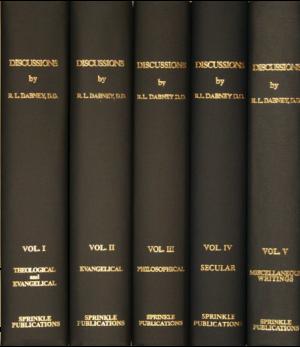
The great Southern Presbyterian theologian Robert Lewis Dabney has been mentioned a number of times on this site. It is a very telling indication of our times that such a visionary man is so little known, and usually slandered when mentioned at all. You can find the entire collection of his written works at the Dabney Archive, all of which are well worth reading. However, such a massive undertaking can be a bit overwhelming, and so on Sundays I have begun posting bite-sized excerpts from Dabney’s works with perhaps a little bit of my own commentary. This will be done in hopes of promoting wider readership for this great man. You can find links to all the previous “Dabney on Sunday” posts at the bottom of this post.
The following excerpt is taken from a speech given by R.L. Dabney at the Annual Commencement of Hampden Sidney College on June 15, 1882, entitled “The New South.” In the speech, he discusses some of the factors which led to the destruction of the original American form of government, one of which was the redefinition of terms like “equality” and “liberty.”
I would place as the first of these adverse conditions the silent substitution, under the same nomenclature, of another theory of human rights, in contrast with, and hostile to, that of our fathers. Those wise men did indeed believe in a certain equality of all men; but it was that which the British constitution (whose principles they inherited) was wont to express by the maxim: that every British citizen “was equal before the law.” The particular franchises of the peer and the peasant were very unequal, but in this important respect the two men were “equal before the law,” that the peasant’s smaller franchises were protected by the same law which shielded the peer’s larger one. This is the equality of the golden rule, the equality of that Bible which ordained the constitution of human society out of superiors, inferiors and equals; the equality of the inspired Job (ch. 31: 13-15) who in the very act of asserting his right to his slave, added: “Did not he that made me make him? If I did despise the cause of my man-servant or my maidservant when they contended with me, what then shall I do when God riseth up?” This is the equality which is thoroughly consistent with that wide diversity of natural capacities, virtues, station, sex, inherited possessions, which inexorable fact discloses everywhere and by means of which social organization is possible. But in place of this, the equality taught by Hampden, Vane, Pym, Melville, and the Whigs of 1776, our modern politician now teaches, under the same name, the equality of the Jacobin, of the “Sans culotte,” which absurdly claims for every human the same specific powers and rights. . . .
Our fathers valued liberty, but the liberty for which they contended was each person’s privilege to do those things and those only to which God’s law and Providence gave him a moral right. The liberty of nature which your modern asserts is absolute license; the privilege of doing whatever a corrupt will craves, except as this license is curbed by a voluntary “social contract.” . . .
These are a few items of the new creed, which has stolen the nomenclature of the old. Since it is a theory at all essential points antagonistic to the old, its prevalence cannot but supplant those sound institutions which were the natural outgrowth of the orthodox doctrine.
This redefinition of terms is even more outrageous today than in Dabney’s. Terms like “American,” “conservative,” “liberty,” “equality,” “freedom,” “patriotism,” “rights,” etc., etc. in their modern usage would be unrecognizable to someone from our founding fathers’ generation.
Previous Dabney on Sundays:
Universal Suffrage
Abstractions
| Tweet |
|
|
|




